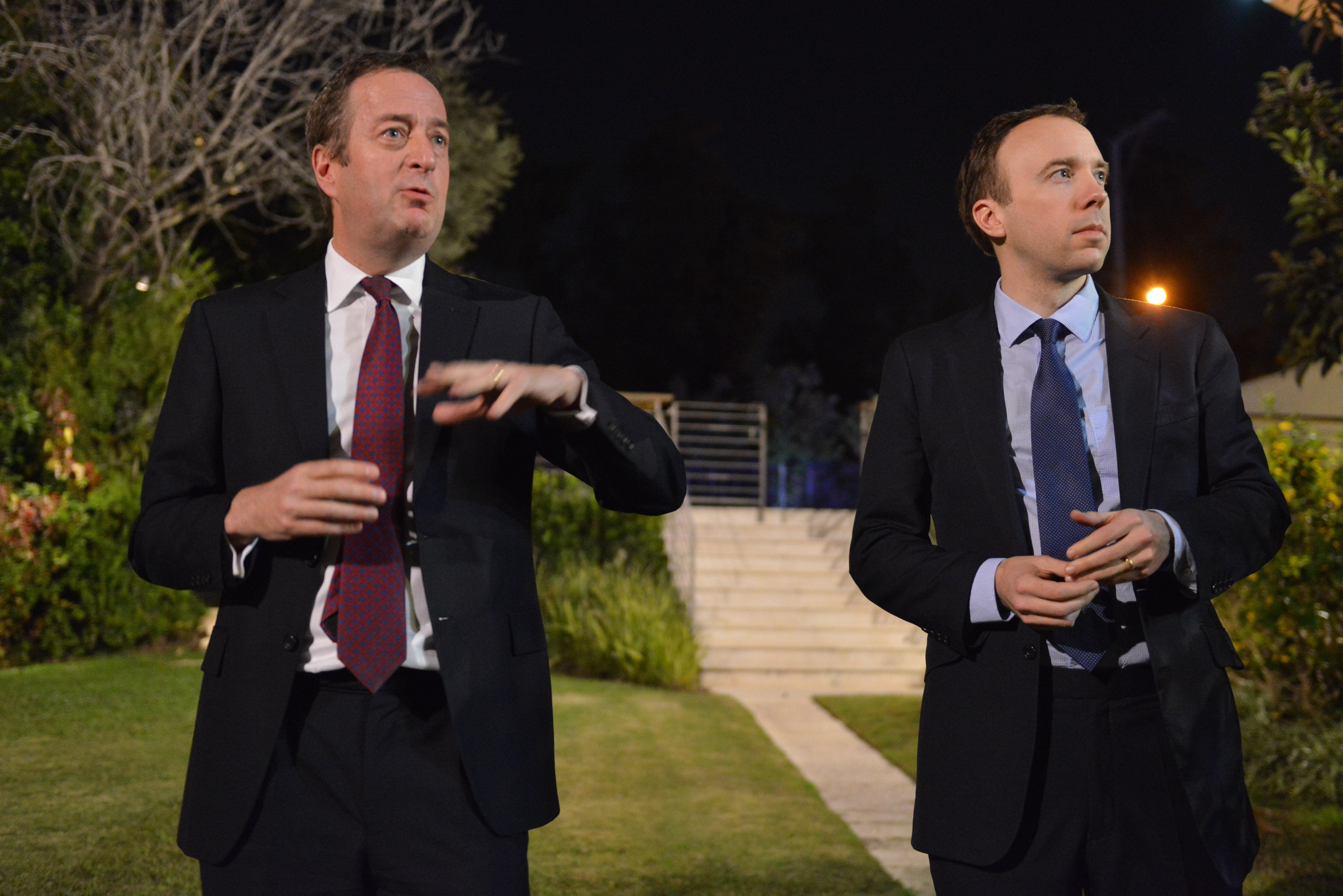“We, too, want to be a startup nation,” says UK Cabinet Minister Matthew Hancock, who is leading a British trade delegation to Israel, so that the two countries may work more closely together on cyber-security.
“There is a huge amount of opportunity to collaborate,” Hancock tells NoCamels. “In the UK, we’re building a national cyber center to bring together all of the cyber responsibilities across government units, and one of the things that we need to do better in the UK is link the government’s cyber-security work with the wider startup entrepreneurial ecosystem.”

British Ambassador to Israel David Quarrey (left) and Minister for the Cabinet Office Matt Hancock (right). Photo by Louiz Green
With over 400 active cyber-security startups, Israel is not only a leader in the field, responsible for 20 percent of global trade in the sector; rather, the country has pioneered a startup economy in a technological field that was originally the exclusive domain of governments.
SEE ALSO: Keeping The Lights On: Israeli Startups Protect Against Dire Cyber Attacks
Founded in 1952, ‘8200,’ the elite intelligence unit of the Israeli Defense Forces, has become synonymous with cyber-security expertise, largely thanks to the technology companies that its alumni have established. The founders of NASDAQ-traded companies Check Point, Palo Alto Networks and CyberArk all graduated from 8200, as did many of the founders of the younger cyber-security startups. To borrow the phrase of one venture capital investor, “8200 is like our Harvard.”
In other words, the know-how that 8200 and other intelligence units develop internally is often taken out into the private sector, where it is customized for a variety of uses: How to secure your mobile phone, for example, when most apps are chock-full of code ‘vulnerabilities’ that can be hacked (yes, there is an Israeli startup that deals with that too: AppDome).
“People keep telling me that in Israel this link is very strong, and I want to know how you’ve done it,” Hancock says about the public-private cooperation in cyber-security. “How can we make this happen in the UK?”
Visiting Israel for the first time this week, Hancock is discussing bilateral relations with Israeli Prime Minister Benjamin Netanyahu, who has already called upon like-minded governments to cooperate on cyber-security. “What we need is a meeting of international leaders, to discuss what could be done among countries that want to maintain freedom and safety in their societies. We will then be able to establish international standards that will increase cyber-security,” Netanyahu said three weeks ago at the annual CyberTech Conference in Tel Aviv.
SEE ALSO: London Mayor Boris Johnson Praises Startup Nation During Visit, Talks Of “Fantastic Partnership”
Sign up for our free weekly newsletter
SubscribeThat cooperation, he stressed, should not be limited to bilateral governmental agreements, but should extend all the way to academia and the private sector. “Why can’t young mathematicians from around the world come here for a few years and be part of this growth and afterwards they can go back to their countries and companies?” Netanyahu asked. “I want Israel to be not merely a cybersecurity power in its own right, but a generator of these capacities for worldwide usage.”
British cyber-security experts convene in Beersheba
The British trade delegation, organized by the UK Israel Tech Hub, appears to be the beginning of that collaboration. Members of government, cyber-security strategists from British Telecom, National Grid and Lockheed Martin, as well as cyber-security experts from the University of Kent and Queen’s University Belfast are visiting Israeli companies and CyberSpark, the technology park adjacent to Ben Gurion University (BGU) in the southern Israeli city of Beersheba.
Initiated three years ago, CyberSpark is now home to more than 1,500 research engineers collaborating with the university, the National Cyber Bureau, and multinational companies. Most recently, Deutsche Telekom’s Innovation Labs at BGU discovered previously untraceable ‘botnets,’ otherwise known as a “zombie army,” of computers that have been remotely programmed, unbeknownst to their users, to forward malware (malicious code) to other computers connected to the internet. One of Israel’s largest and most active venture capital firms in the filed of cyber-security, Jerusalem Venture Partners (with over $1 billion under management), has also headquartered their Cyber Labs in Beersheba.
“This ecosystem is becoming a model for what can be achieved when the government, academia, and the private sector team up to implement a vision, and in this case to create a center of knowledge,” according to Prof. Rivka Carmi, President of Ben Gurion University, who also spoke at CyberTech 2016.

Hancock addressing members of the Israeli and British governments at the British Ambassador’s residence. Photo by Louiz Green
Encouraging university students to study computer science, but more importantly to start their own companies after they graduate, is something that Hancock sees as an area of improvement. “We’re definitely getting better in the UK,” he says about encouraging entrepreneurship. “But it’s a big cultural journey that we’re taking.”
Perhaps, then, cyber exchanges will go hand-in-hand with cultural ones.
Photos: Louiz Green for the UK Israel Tech Hub
Related posts

Editors’ & Readers’ Choice: 10 Favorite NoCamels Articles

Forward Facing: What Does The Future Hold For Israeli High-Tech?

Impact Innovation: Israeli Startups That Could Shape Our Future






Facebook comments